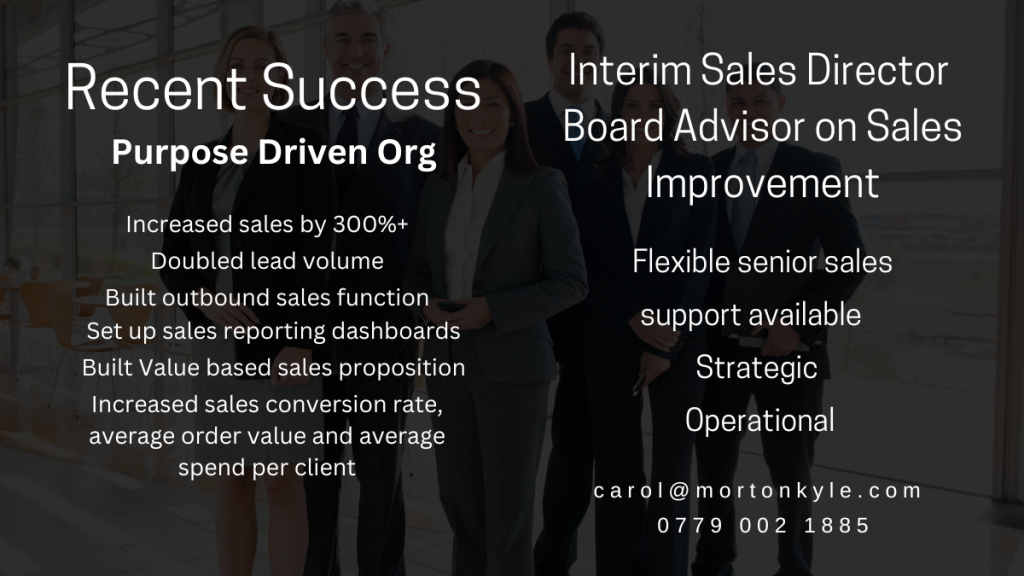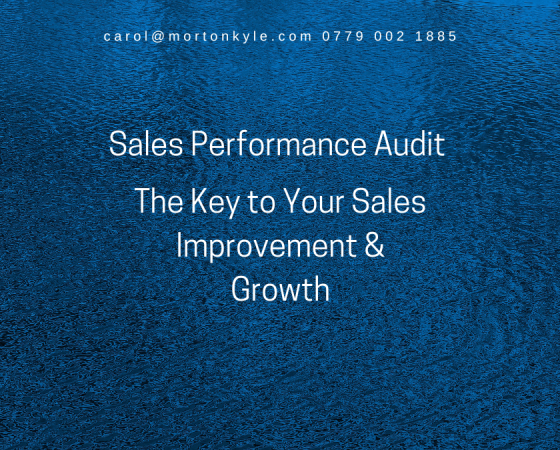It’s tough not to get excited about the benefits of a sales audit, not least because as a CEO, an Executive Leadership Team or the driving force behind the sales function, then I know sales performance improvement is never far from the top of your agenda.
At some point you’ve probably thought about conducting a sales audit. Maybe for added insight into how to optimise/maximise the sales function, or to solve a particular sales challenge.
Maybe you’ve been struggling with a sales challenge and been stuck in limbo without enough info to progress with certainty…
Or maybe, you’ve thought about it and not done anything?
Either way, it may be a good time to look at some of the many benefits of running a sales audit, whether that’s for new business sales teams, direct sales or account management functions.
Why?
Typically, Leaders who engage me to run their sales audits have a couple of key concerns, namely:
- Sales growth
- Building competitive advantage
- Performance improvement / ‘not wasting opportunities and cash’
- Productivity and efficiency
These are the challenges most often under discussion. If that’s the same for you then perhaps we should talk….
Sales Audits Aren’t Just For When Things Go Wrong!
The highest performing sales teams run so well because of the attention that’s given to the moving parts!
Everyone knows what Great, Good, Normal and Sub-Par looks like, and they have in place the means to spot when any element of their sales performance is about to slip down a notch….and, more importantly, what to do to fix it before the gentle slide becomes a free fall, and the rut becomes a deep trench.
So, when you’re looking to have the same amount of control, and the same ability to repair and build your sales function to that level then a Morton Kyle Sales Insight Audit should definitely be your starting point.
I haven’t ever seen a sales audit that didn’t have a 100% plus ROI within days
You can see why when you look at some of the reasons below!
Conducting a Sales Audit – The health of your sales function is a leading indicator of the sustainability of your business.
And, like any other vital component of your organisation, the sales function requires regular assessment and fine-tuning to maximise then optimise its potential.
Times changes, buyers change, competitors come and go, economics of running the sales team change…the truth is, the bar typically only gets higher in sales performance, and that’s not even factoring increased costs of servicing business development, increased economic pressures and maybe the extra interest the bank or investors are giving in as they look for even better returns…
And all of that means that standing still is not an option.
So how do you make sure your sales function is keeping up?
This is where a sales audit comes into play.
A Morton Kyle Sales Insight Audit is a thorough examination of your:
- Sales Process
- Sales funnel
- Sales Pipeline
- Sales Forecast
- Sales Strategy
- Sales Skills
- Overall Performance Metrics
- Sales Leakage
The good news is, you don’t have to do everything at once, one of the easiest ways to get started, giving you the richest seam of information to work with is either the Sales Pipeline Audit or the Sales Leakage Report…you get to choose when we look at your priorities during our scoping meeting with your Sales / leadership function.
There are untold sales audit benefits felt at all levels of the organisation from front lines sales people to team leaders, managers, the board and investors. Findings that impact across multiple functions – from marketing through to debt collection, advocacy, retention, churn and brand.
Sales Audit Benefits
Here are 39 compelling reasons why every CEO and Senior Leadership Team should conduct a sales audit across their sales and customer interfacing functions:
- Revenue Boost: Identify hidden opportunities and inefficiencies, which directly lead to an immediate boost in revenue generation.
- Improved Sales Efficiency: Discover areas where the sales process should be streamlined, leading to increased efficiency and reduced wastage of resources.
- Enhanced Prospect Experience: Understanding prospect interactions and friction points can better help you create a more satisfying experience for your prospects by making it easy to buy from you.
- Competitive Advantage: Uncover unique selling points that set your sales team apart from competitors and leverage them to gain an edge.
- Better Sales Team Performance: Identify skill gaps within the sales team, often these are easy fix, blind spots that can be solved quickly with an immediate impact on motivation and results
- Optimized Sales Funnel: Pinpoint weaknesses in your sales funnel and optimise it to convert more leads into prospect and customers.
- Greater Conversion Rates: Implementing insights from a sales audit will lead to higher conversion rates and improved lead-to-customer ratios….more bang for your marketing budget!
- Effective Lead Generation: Discover new lead generation strategies, ditch the ones that don’t convert, and fine-tune existing ones for optimal results.
- Improved Sales Forecasting: A sales audit helps you develop more accurate sales forecasts, aiding in better business planning. This is such a big win it should be at the top of the list!
- Alignment of Sales and Marketing: Ensure that sales and marketing efforts are in sync to create a cohesive prospect journey, and so that both sales and marketing team are looking at the same performance metrics
- Data-Driven Decision Making: Rely on data and insights from the sales audit to make informed business decisions around growth, spend, resource allocation, head count and forecasting.
- Identifying Ineffective Sales Channels: Determine which sales channels are underperforming and reallocate resources to more productive avenues.
- Target Market Refinement: Refine your target market based on the audit findings, enabling more focused marketing efforts.
- Pricing Strategy Review: Evaluate your pricing strategy to ensure it aligns with market demands and customer expectations.
- Sales Process Standardisation: Standardise your sales process for consistency and scalability….this makes sales performance glitches simple to identify and fix as you move into higher levels of growth.
- Employee Motivation: Understand the factors that motivate your sales team, fostering a more engaged and driven workforce, plus build self management and accountability into the sales function, a sales audit is fantastically enabling for the top performers in your team.
- Customer Retention: Identify opportunities to increase customer retention and loyalty through better sales strategies…helping to reduce churn, build advocacy and minimise waste
- Sales Technology Utilisation: Analyse the efficiency of sales tools and technology, optimising their usage for maximum impact….how much tech do you have that’s not being used, or used poorly?
- Risk Mitigation: Spot potential risks in your sales process and develop contingency plans to mitigate them.
- New Market Penetration: Explore new markets with the insights gained from the sales audit, expanding your business reach.
- Strategic Partnerships: Identify potential strategic partners that can enhance your sales efforts.
- Brand Perception: Assess how your sales process influences the perception of your brand in the market.
- Sales Team Collaboration: Encourage collaboration within your sales team by leveraging the audit findings.
- Long-Term Growth Planning: Utilise the sales audit to plan for sustainable, long-term growth.
- Enhancing Upselling and Cross-selling: Discover opportunities to upsell and cross-sell to existing customers effectively.
- Sales Goal Alignment: Ensure sales goals align with the overall objectives of the organization.
- Territory Optimisation: Optimise sales territories for maximum coverage and efficiency.
- Sales Team Incentives: Design performance-based incentives that motivate and align with business objectives.
- Cost Optimisation: Identify cost-saving opportunities within the sales function without compromising results.
- Enhanced Sales Reporting: Create more comprehensive and insightful sales reports based on audit findings.
- Sales Training Effectiveness: Evaluate the effectiveness of sales training initiatives and refine them accordingly.
- Sales Forecast Accuracy: Improve the accuracy of sales forecasts through better data analysis.
- Sales Cycle Evaluation: Understand the length of your sales cycle and develop strategies to shorten it.
- Customer Persona Refinement: Refine customer personas based on the data gathered from the sales audit.
- Sales Process Compliance: Ensure that the sales team complies with established processes and guidelines.
- Sales Metrics Alignment: Align sales metrics with overall business KPIs to track performance effectively.
- Win/Loss Analysis: Conduct win/loss analysis to identify trends and patterns in sales successes and failures.
- Crisis Preparedness: Use audit insights to create sales strategies that are adaptable to different market conditions.
- Long-Term Sustainability: Embrace continuous sales audits as a means to maintain competitiveness and long-term sustainability.
Information Overload? Not with the tailored Morton Kyle Sales Insight Audit
We won’t spend time digging into things that won’t help you!
We want results, so we’re results and valuable outputs focussed.
So don’t get phased thinking you’ll get a 400 page report that will be interesting for 10 days then gather dust until you next move offices!
That’s not how we work.
Only you know what your sales challenges are, what your growth plans are and importantly, what issues you wrestle with as a sales function – a Morton Kyle Sales Insight Audit doesn’t cover everything – it covers what you need, as, and when you need it.
Every sales audit is tailored to you.
Conduct a Sales Audit with Morton Kyle
Imagine your sales team operating at its peak performance, consistently exceeding targets, and effortlessly closing deals.
Picture your revenue soaring to new heights, your conversion rates increasing, reduced sales cycle durations, increased client spend and average order values…and your competitors scratching their heads about success in the industry.
Achieving such outcomes requires a deep understanding of your sales processes, identifying areas of improvement, and leveraging strategic insights to enhance your overall sales effectiveness.
It requires you to have a handle on the cogs in your sales function and how they work in convert to give you the sales results you need…
That’s precisely where our sales audit comes into play.
This meticulously crafted process involves a holistic evaluation of your sales operations, strategies, and execution, aimed at uncovering hidden opportunities and unleashing your team’s full potential.
We have helped countless CEOs uncover hidden revenue streams, streamline their sales processes, and achieve unprecedented growth through this highly tailored approach.
Here are some key additional key elements you can focus on when it comes to having Morton Kyle conduct your sales audit
Performance Management – the sales audit methodology lends itself to being an informal introduction of performance management within the sales function
CSI – It can herald the beginning of Continuous Sales Improvement
Meaningful Management Information – It builds critical sales dashboards and meaningful Balanced Scorecards that allow the saes function and senior exec team to align behind leading and lagging sales indicators
Positioning – it pays deep attention to positioning and the value added proposition your organisation delivers – this is probably one of the single most impactful elements of the sales audit
Cohesive Teams – it brings the sales function together to lift performance using transparency, trust, ambition and accountability
Better Ways of Working – it identifies sales best practice
Improves Leadership Range – it empowers the sales leaders to become leaders, coaches, trouble shooters and adopt situational leadership skills
Clarity of Vision – between the relationship between activities and actions and valuable and successful outcomes
Forecast Accuracy – no more melting sales forecast – building accuracy into forecast construction
Considering Scope For Your Performance Audit
Not all sales audits include every single element of the audit. Of course, in any sales function, there are high levels of connectivity between all the moving parts, but looking at every single element at the same time is fruitless and costly…we don’t support that way of working for many organisations. instead we focus on getting to know where you are today versus where you would like to be!
If you’re looking at a specific sales challenge around new business generation (a really common challenge) then you might find that you’ll want you focus all of your efforts on the following:
A Sales Funnel Audit –
A sales funnel audit looks at how are you getting opportunities into the sales funnel, and how that translates throughout the sales funnel.
It dives into the quality and quantity of opportunities and their specific sales channel characteristics in terms of some key characteristics. Namely:
- Average order values
- Sales cycle duration
- Life time value
- Conversion rate
- Win loss rates etc.
The sales funnel audit is very much designed to look at the effectiveness of the bridge between sales and marketing and driving a stronger understanding around marketing activities and spend vs results.
This kind of audit is great if you want to maximise the effectiveness of your marketing budget, and build some meaningful metrics and strategic alliances between sales and marketing!

A Sales Pipeline Audit –
A sales pipeline audit is very similar to the above but where as the sales funnel audit is sales and marketing focused, the sales pipeline audit is more focused on the capabilities within the sales team alone.
That might cover the sales process, skills, behaviours, habits and systems, targets, lost sales, data usage, best practice, time management, product knowledge, management, culture, pipeline management etc within the sales team itself.
You sales pipeline audit assesses what kind of sales engine you have.
So whilst we look at the same numbers as above we look at it through the individual and sales team performance lens to identify improvements and efficiencies.
This is powerful if you’re looking to introduce elements of continuous sales improvement into your team, you want to increase levels of responsibility account-ability and engagement within the sales team or you’re looking to benchmark and develop other performance management initiatives, perhaps around incentives or call standards, activity levels, standardised sales processes etc
A sales pipeline audit is also an excellent way to clear out rubbish from the sales pipeline, set some ground rules for CRM use (not abuse), and help with sales forecasting.

Another common type of sales audit is
A Sales Forecast Audit –
The Sales Forecast audit is powerful if you find your sales forecast are wildly inaccurate, and melt like snow in the sun.
If you’re struggling to get a meaningful read on sales forecasting this this should be your first port of call.
A sales forecast audit is a useful tool if you find you have a bloated and unstable sales CRM and you’re just not getting the meaningful data you need out of the system.
Banks, Executive Teams and Investors rely on accurate sales forecast, so any instability in this area can be costly in terms of reputation and questions about ‘finger on the pulse’ management…a sales forecast audit can clear this up for you.
It’s also a great eye opener – unbiased and independent way – to understand if you really have the capability and capacity to deliver the business ambitions.

Sales Audit Benefits – Insights and Solutions – You’re in Control!
One of the biggest benefits from your Sales Audit – whichever audit you select (or they can be combined in a Sales Process Audit) is that you get the raw data, the curated data, the challenges scoped out, and via the Fast Action Pack and 30 Day Plan, you discover how to fix the very specific issues that are holding you back!
That means you see how your current issues can be resolved – at which point you can take sole control to implement or you can look at a ‘done with you ‘ support package, or a ‘done for you’ support package.
It’s best to think about your sales audit as a heuristic and iterative process that seeks to discover and uncover the friction points to your sales growth and organisational success, rather than a root and branch exploration that is more academic than impactful! We are aiming for sales improvement!
You can find more details here – Morton Kyle Sales Audit

A Sales Audit Benefits Your People as Well as Your Bottom Line!
You’ll see growth in your:
- Sales Team as they identify revenue and value adding tasks that are directly related to positive results and outputs
- Your Sales Management Team as they get to understand how much power and control they really do have in achieving, and smashing, sales targets
- Prospects when they experience what it feels like to engage with your sales professionals as opposed to other sales teams using hit and run sales tactics
- The rest of the organisation when they realise that the sales forecasts are solid and not inclined to melt like snow on a sunny day
- Your board as they can have confidence in what sales are saying
- Your marketing team when they see their hard earned leads being converted at a much higher rate!
Conclusion
In conclusion, a sales audit can be just a one-time event; with full knowledge transfer to your internal team to drive the required changes, or it could be a rolling commitment of regular reviews.
You’re in control.
Organisations that conduct a sales audit on a regular basis find the insights invaluable in helping them develop and deliver on key strategic growth initiatives, as well as fostering a competitive spirit towards getting better in each audit cycle, especially when aligned with the quarterly reviews.
In the same way, we’ve had some breakthrough one off sales audits where the knowledge transfer around intel and skill has been transferred to internal management teams who have stepped up and held themselves accountable to implement and deliver. This is amazing to see.
Either way, a Morton Kyle Sales Insights Audit is a valuable and integral part of your organisation’s growth strategy.
By regularly evaluating your sales function, you can make data-driven decisions, optimize performance, and maintain a competitive edge in a dynamic business landscape.
So, as a visionary leadership team you know that being armed with the correct information will lead to enhances, speedy decision making. It will ensure you are better able to conquer future challenges.
If you’d like to discuss how a sales audit can help drive your revenue, margin and growth contact Carol on 0779 002 1885. You can book a scoping meeting to discuss your current challenges.
The sales audit benefits are broad and wise.
You can build a package to support your aims, and unleash the full revenue and competitive potential in your sales function.
It’s your key to future-proofing your organisation and driving your business towards sustainable sales success.
Remember a sales audit benefits everyone!


Hi, welcome to Morton Kyle Limited.
As Founder and Lead Consultant, I’ve spent the last 30+ years in the trenches of sales—fixing broken pipelines, rebuilding underperforming teams, and helping businesses close more deals at higher margins.
I’ve worked with global brands, challenger firms, and fast-growth sales teams, helping them:
✔ Fix underperforming pipelines – turning ghosted leads into closed deals.
✔ Increase win rates – without discounting or chasing bad-fit prospects.
✔ Build sales systems that actually work – so you don’t waste time on ‘busy work’ that doesn’t convert.
I’m not another ‘sales trainer.’ I don’t teach theory. I fix sales problems – fast. And if you’re still reading, it means you’ve got a problem that needs fixing.
I know how sales leaders think because I’ve been one. I know what the board wants because I’ve sat in those meetings.
And I know what works – because I’ve done it, tested it, and proved it across industries, markets, and economic downturns.


Comments are closed.